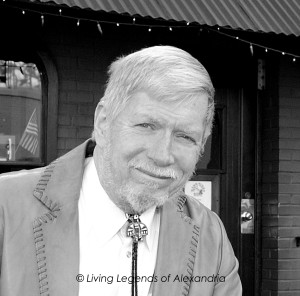In Memory – Fred Parker

We are sad to hear of the passing of Living Legend Fred Parker. Fred passed away on April 26, 2020. His accomplishments as a Living Legend can be read here.
Fred Parker, founder of Hard Times Café, dies at 78
By Denise Dunbar – May 7, 2020 – https://alextimes.com/2020/05/fred-parker-obituary/
Local businessman Fred Parker, best known for founding the Hard Times Café in 1980 with two partners, died on April 26 of esophageal cancer. He was 78.
Parker, whose aunt ran a depression-era chili parlor in Oklahoma, sought to create an authentic southwestern roadhouse atmosphere in his café. Though additional Hard Times locations were eventually opened, the original restaurant at 1404 King St. in Old Town is full of memorabilia that Parker collected.
Parker was also known for his 1941 Chevrolet pickup truck with a horse statue in the bed, which made appearances at city parades and events through the years. According to friends and family, Parker loved all things southwestern, not just the food, but the culture, people and artifacts. He had an impressive collection of cowboy boots, hats and suits which he frequently wore.
Trained as a graphic designer and artist, Parker was working at the National Gallery of Art in D.C., creating posters and signage for the museum’s exhibitions, when he founded Hard Times Café. Along with several National Gallery co-workers, Parker also founded the Del Ray Desperados, a party band that performed at area events for decades.
Parker was remembered by family members and friends as fun-loving and creative, yet humble and understated. Parker’s oldest son, Jonathan Parker, recalled his father’s boisterous side.
“He had a very playful sense of humor,” Jonathan Parker said. “It was very easy for him to connect with me and my brother Ned. Everything he would do with us, it felt like it came very natural to him.”
Parker coached his sons’ baseball teams. Each Halloween, he created a different themed haunted house in the family foyer, including King Kong, The Mummy and The French Revolution – complete with a guillotine – that generated considerable excitement among the Parker boys’ friends.
“He really enjoyed being a kid even in adulthood in many ways. I was so proud of that,” Jonathan Parker said. “I can remember going to school and my classmates who lived close by would always ask me, ‘So what’s going to happen for Halloween this year? Is there any way we can cut to the front of the line?’ He was a very popular figure in that scene.”
And then there was the Teenage Mutant Ninja Turtles appearance. At one of Jonathan Parker’s early birthday parties, held upstairs at Hard Times in what is affectionately called “the attic,” his dad made quite an entrance.
“There were all these kids dressed up as their favorite Ninja Turtles, and I guess my dad made an appearance coming up the stairs dressed as The Shredder, the archnemesis of the Ninja Turtles,” Jonathan Parker said. “Apparently, mom said – I don’t remember this – but she claims it was a very convincing costume … all of the kids apparently started crying and hid under the tables. And we had to have my dad take off his mask and say, ‘Look, it’s only Mr. Parker, it’s not actually this bad guy.’”
Jonathan Parker also recalls the time his father, together with other neighborhood dads, created a luge down their fairly steep street in the Jefferson Park neighborhood.
“It might have been the blizzard of ’96,” he said. “I remember being woken up at like two in the morning. My dad said, ‘You’ve got to get out of bed! The luge is ready!’ He grabbed me out of bed and [soon] we were speeding down the hill at a pretty fast speed. … He liked to indulge his inner child.”
According to Parker’s childhood friend David Henderson, this playful side was apparent even back when they met in the seventh grade. On their first meeting, Parker was in a line at school laughing with another friend about a new magazine – which turned out to be Mad Magazine.
“I think, inspired by Mad Magazine, Fred developed an artistic style that kind of reflected that somewhat irreverence to established authority and a very creative, fresh thinking about any subject he touched,” Henderson said.
Henderson said Parker’s love of his Southwestern heritage was an important part of his friend’s persona.
“I don’t think Fred was necessarily a showman, but he was living a life that he wanted to live. He wanted to be a cowboy. … I think he respected the Western heritage of the United States, everybody from Roy Rogers and Tex Ritter to Native Americans and everybody else,” Henderson said. “He respected his aunt who had that chili roadhouse. He also respected the people who had no pennies to rub together who would eat there.”
Carol Christensen, who married Parker in 1984, said their shared love of art, music and the outdoors helped bring them together.
“Fred was a gentle person, very kind, very fun-loving. He loved to do pranks and jokes and he liked to have adventures,” Christensen said. “He had an artistic sensibility because he was originally trained as a graphic designer and an artist. We had that in common. And he liked the outdoors and so did I.”
Parker and Christensen both worked at the National Gallery, and they met through a band called the Del Ray Desperados – later shortened to just the Desperados – that Parker had helped form. While Parker kept the rhythm with spoons or a washboard, Christensen was an accomplished singer.
Don Zientara was another National Gallery friend who played bass then guitar in the Desperados.
“It was basically a party band. Totally cover songs pretty much. It was a party band, a dance band,” Zientara said. “We did that for many, many years. Gosh, 40 years at least.”
Inspired by his Aunt Irma and one of his favorite D.C. lunch spots, Hazel’s Texas Chili Parlor, Parker started the Hard Times Café while working at the National Gallery in 1980.
“On his mother’s side, the family was from Oklahoma and Texas and his Aunt Irma, during the Depression, ran this depression-era chili parlor in Oklahoma. He liked the idea of a chili parlor. It was part of the family heritage,” Christensen said.
Both Zientara and Henderson emphasized Parker’s humble, understated nature, which fit right in with what Parker viewed as the cowboy code of honor.
“If you went up in the chili parlor, and the different cowboys, Hopalong Cassidy, Roy Rogers, Gene Autry, they had their codes of honor on the wall. It was basically just good sense and being a real gentleman. And Fred was a real gentleman,” Zientara said.
Before opening the Hard Times Café, Parker held several months of dress rehearsals in his house in Del Ray. He set up tables for four with tablecloths and, in a nod to his depression-era aunt, served free chili to all who came to the door.
“He was trying to perfect the recipe,” Christensen said. “And then he would get feedback from people.”
She said Parker loved to host parties, which included the dress rehearsals for the Hard Times, but also twice a year parties by the Del Ray Desperados called the Spring Fling and the Fall Ball.
“What Fred loved to do was throw a party,” Christensen said. “We had a big Christmas open house every year, and he served chili. And he rented this thing called a ‘Dogeroo,’ it’s for chili dogs, it roasts hot dogs. … A lot of our good memories are of the teamwork involved in organizing for these parties.”
Another thing Parker loved were the open mic nights in the Hard Times’ attic, that Zientara helped start several years ago. For Parker, who suffered from Parkinson’s disease in his later years, these Tuesday night outings became increasingly important.
“Don would help set up sound equipment. There would just be such a wide range of people coming up and doing spoken word poetry. You’d have singer songwriters with their guitars. You would have comedians. … At this point, my dad would get up and tell a joke or two or recite some spoken word thing he had known as a kid,” Jonathan Parker, a musician who also sometimes played the saxophone at the open mic nights, said.
Zinetara said the open mic nights serve a useful purpose of giving musicians in town an opportunity to play.
“For the open mics for the last three years, he would sit there with me and I would have a beer or something and he would have some peanut butter pie and seltzer water or something and he would just enjoy it. He enjoyed being with people. He was a very sociable person,” Zinetara said.
For Henderson, as a shy seventh grader back at school in Arlington, Parker’s sociability and creativity helped provide a sense of belonging. Because their friend group didn’t fit into any of the usual school niches – they weren’t jocks or nerds – Parker named them the “Super People.”
“I was a little embarrassed, but we were the ‘Super People,’” Henderson said. “Part of being super people was to be understated.”
Ultimately, Henderson said, Parker was simply “cool.”
“What Fred presented to me and across a lifetime span of 65 years was ‘cool.’ Fred was ‘cool.’ He was imaginative, innovative, creative, gracious, thoughtful and all the best qualities that we strive to achieve,” Henderson said. “He came about it naturally and with an unassuming manner.”
Fred Parker was born Nov. 12, 1941 in Pensacola, Florida to the former Lois Goodfellow and Col. Frederic Thompson Parker. Because his father was a colonel in the Army Corps of Engineers, Parker lived in many different places as a child, including Hawaii, Oklahoma, Governors Island and the Bahamas, where his father was commanding officer for several years during World War II.
The family settled in Arlington in 1953 and Parker attended Wakefield High School. He attended Phoenix College and the University of Arizona, majoring in studio art. After college, he spent a summer working as a cowboy repairing fences on a ranch in Oregon and then returned to the Washington D.C. area, where he worked for the American Forestry Institute and Design and Production, Inc. In 1978 Parker went to work at the National Gallery of Art, where he headed the silkscreen department.
After opening the Hard Times Café in 1980 with his brother Jim and Barry Thompson, Parker juggled both jobs until 1985, when he decided to work for the Hard Times full time.
Parker’s first marriage ended in divorce. He is survived by a son, Charlie Parker of Taos, New Mexico, from that marriage. He is also survived by his wife, Carol Christensen and sons from that marriage, Jonathan Parker of Brooklyn, New York and Edward (Ned) Parker of Alexandria. He is predeceased by his younger brother, James Parker.
A remote memorial service for Parker is planned for May 10 at 3 p.m., and the community is invited to attend. To join the Zoom memorial service from a computer, go to https://us02web.zoom.us/j/7495209598. To dial in, call 301-715-8592. The family asks anyone who wishes to offer a remembrance at the service to contact son Jonathan Parker at jparkermusic@gmail.com by Saturday evening.
